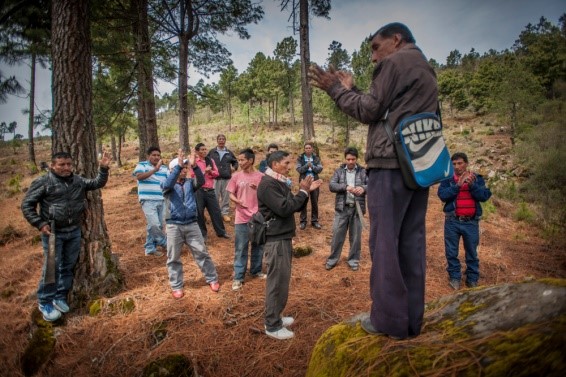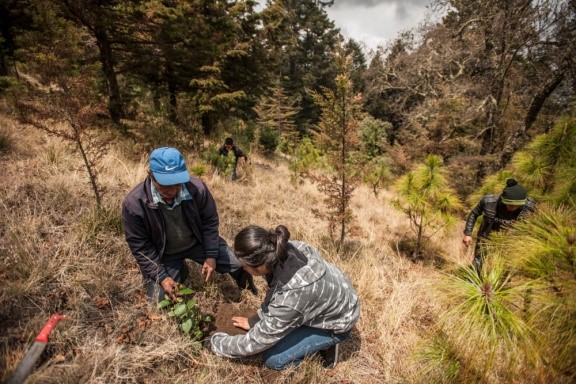


Dans le cadre d'une approche d'adaptation basée sur les écosystèmes et d'une vision par micro-bassin, les efforts déployés à Esquichá se sont concentrés sur l'amélioration des moyens de subsistance et de la résilience des écosystèmes afin de réduire la vulnérabilité au changement climatique. Les tempêtes tropicales et les ouragans tels que le Stand ont affecté les communautés par le passé (infrastructures hydrauliques, érosion ou perte de sources d'eau). L'application d'une approche écosystémique faisait partie du renforcement de la gouvernance pour l'adaptation au changement climatique dans le micro-bassin hydrographique d'Esquichá.
Les mesures mises en œuvre sont les suivantes
- protection et récupération des forêts dans les zones de recharge en eau. Par exemple, la protection des forêts de pins(Abies guatemalensis) qui abritent des sources d'eau alimentant les populations de la partie inférieure du micro-bassin.
- Restauration des terres dégradées et stabilisation des pentes
- la mise en œuvre et l'optimisation de systèmes agroforestiers.
En outre, la nécessité d'une approche plus intégrée de la gestion des ressources en eau a été largement acceptée, en partie en raison de la pénurie d'eau dont souffrent les communautés pendant la saison sèche et dans les parties supérieures du micro-bassin. Le concept de responsabilité sociale environnementale a également été promu parmi les communautés, selon lequel les communautés en amont prennent des mesures qui profitent aux communautés en aval.
- Le changement climatique, et en particulier la disponibilité de l'eau, sont des facteurs qui préoccupent la plupart des acteurs des micro-bassins versants, ce qui accroît leur volonté de donner la priorité aux actions qui favorisent les zones de recharge en eau et la réduction des risques de catastrophe. À Esquichá, la survenue d'événements extrêmes au cours des années précédentes a fortement touché plusieurs communautés, causant des dommages à la fois aux biens (cultures, logements, infrastructures productives) et aux ressources en eau.
- Afin de prouver l'efficacité des mesures d'EbA mises en œuvre pour contribuer à la résilience des communautés face au changement climatique, et donc de renforcer la confiance dans la stratégie adoptée, la première étape a consisté à promouvoir le reboisement dans les parties supérieures du micro-bassin (où se trouvent les sources d'eau) ou dans les zones touchées par les glissements de terrain, ainsi que le travail communautaire autour des pépinières forestières. Ces actions ont permis de consolider le concept selon lequel la couverture forestière est une "assurance collective" face au changement climatique.
- L'évaluation des services écosystémiques du bassin a permis de considérer l'adaptation comme une tâche incombant à toutes les communautés, un moyen d'obtenir des avantages tant pour le micro-bassin d'Esquichá que pour d'autres communautés situées plus bas dans le bassin de la rivière Coatán.